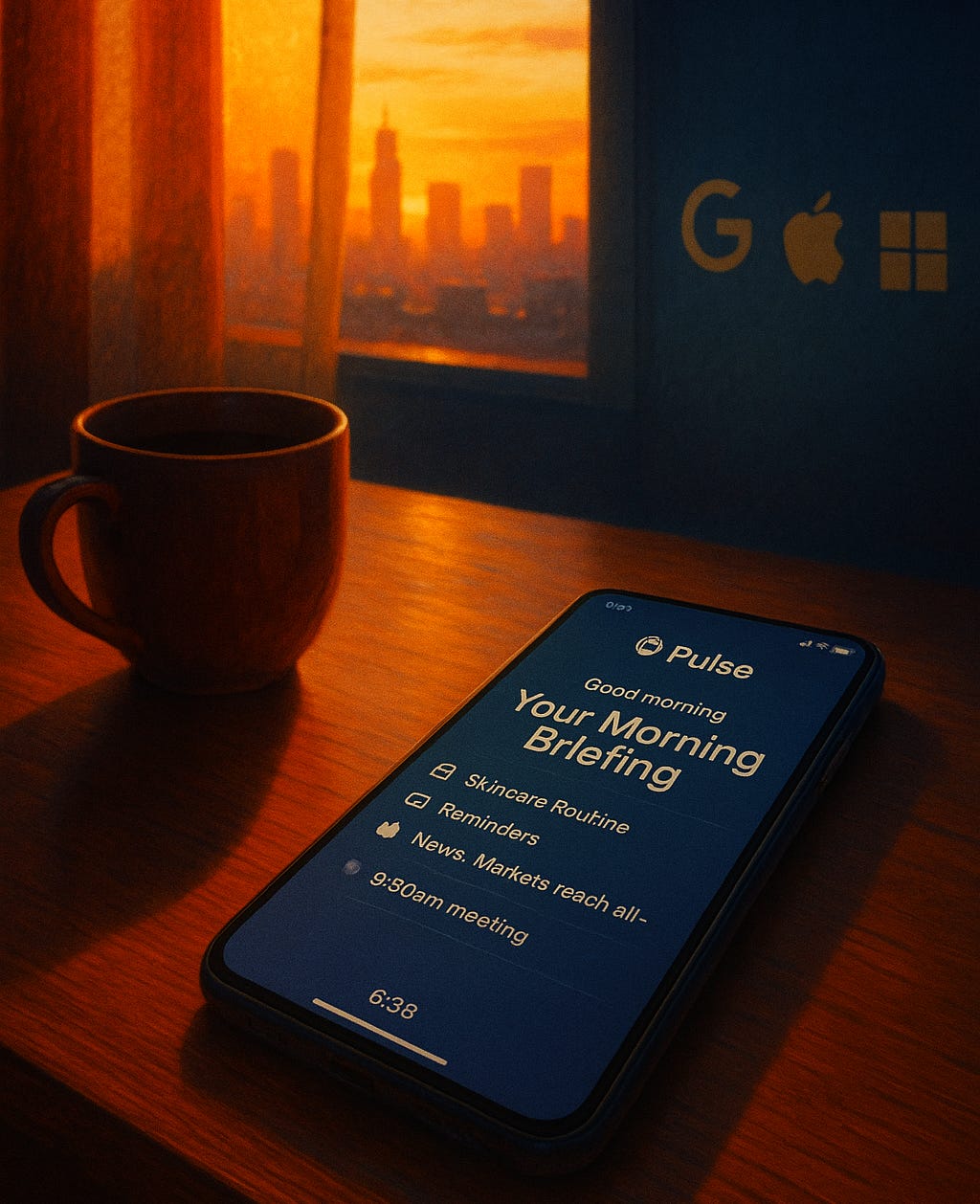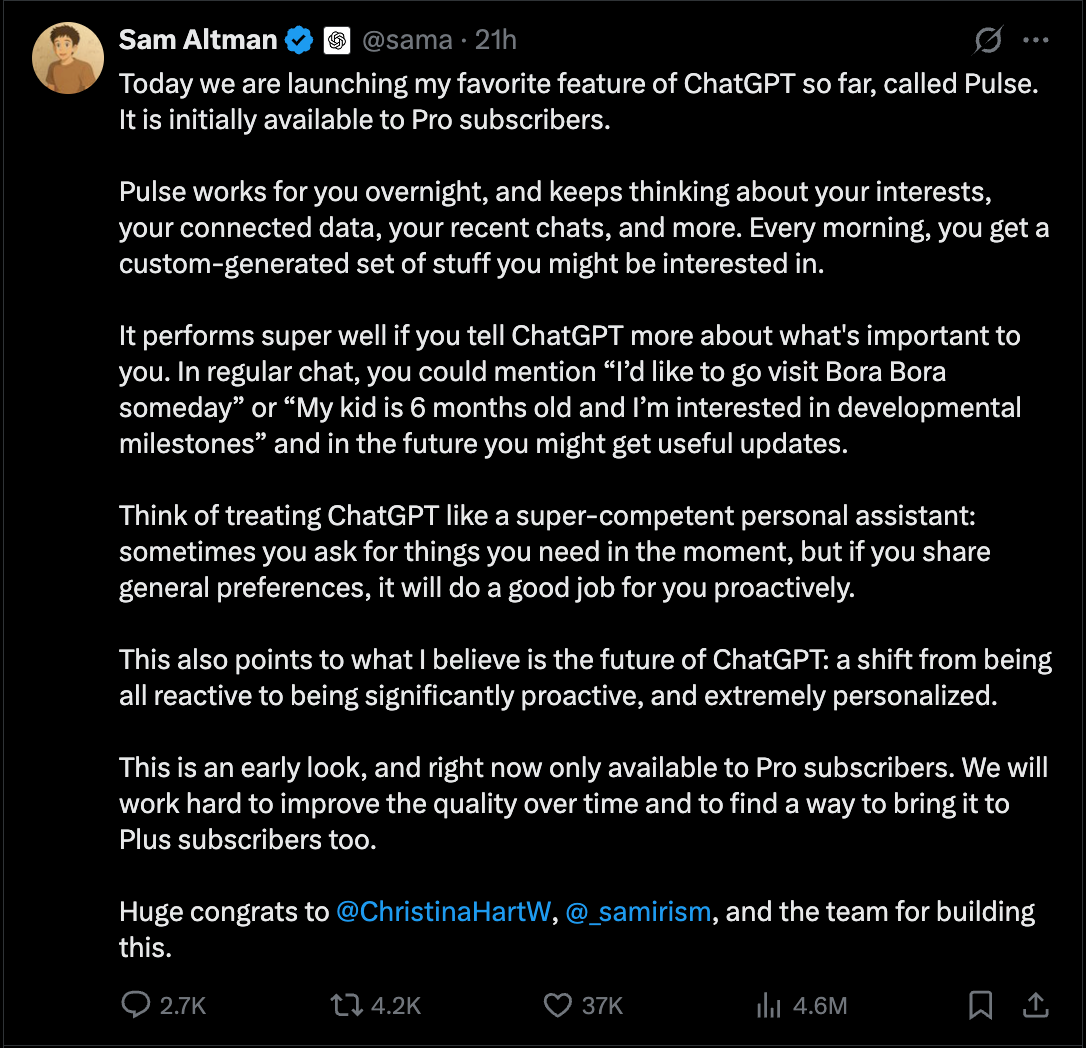Pulse Check: The Fight for the First 5 Minutes
OpenAI’s bid to turn novelty into habit, and habit into dominance
I’ve been waiting for this one.
One of my biggest frustrations with ChatGPT so far: no way to set it and forget it. I’d build a skincare routine and have to open the chat every morning to follow it. I’d ask for meals that hit my macros, then scroll back through the conversation like a digital archaeologist to find the recipe again. Useful, yes. But friction layered on friction.
Pulse, OpenAI’s new “daily briefing” product, flips that dynamic. Instead of me poking the bot, it shows up once a day with what I actually need -routines, reminders, research - without the scavenger hunt. Which, yes, feels like a small quality-of-life improvement, but also like the inevitable next step in consumer AI. You don’t build a giant consumer software category on novelty (“look, it wrote a haiku about my cat”); you build it on habit.
For the past year, ChatGPT has been like a needy friend, always waiting for your texts, asking for context, incapable of initiative. Pulse is the first real sign of a role reversal: proactive, context-rich, and willing to do some of the work of the relationship. Here’s how I see it:
Daily Habit. Pulse is gunning for the most valuable real estate in consumer tech: the first five minutes of your day. Whoever owns that slot wins distribution, retention, and mindshare. That’s not UI sugar - that’s strategy.
Deepening Context. By synthesizing your chats + memory + integrations overnight, Pulse converts fragmented context into a persistent user model. That compounding memory becomes switching-cost glue that generic chatbots can’t easily replicate.
Agent On-ramp. Two months ago OpenAI previewed a “ChatGPT agent” that can browse, log in, plan, and deliver artifacts. Pulse operationalizes a simpler, safer loop - autonomous research → concise outputs - while acclimating users to proactive, goal-seeking behavior. It’s the habit that makes the later “do this for me” jump feel natural. Autonomy doesn’t arrive with fireworks - it arrives disguised as convenience.
Morning Bundle. The morning bundle is up for grabs. Pulse competes with news apps, calendars, email triage, Notion homepages, and “daily digest” newsletters. Own the morning brief and you become the router for attention and later, actions. If Pulse takes off, you don’t fight it, you integrate into it - third-party “cards” for travel, finance, health will appear. The “briefing” will become a platform.
That’s why the usual suspects should be a little nervous.
Google has Gemini on every Android phone and in Chrome, but Pulse builds ritual without OS lock-in - siphoning queries before they ever hit Search.
Microsoft owns the office, but Desktop and Enterprise Pulse are surely coming soon. The moment Pulse reads your meetings, drafts follow-ups, and prioritizes tasks, it collides head on with Copilot.
Apple Intelligence leans on on-device context; Pulse offers cross-platform proactivity now. If OpenAI lands the morning habit on iOS, Siri’s comeback gets harder.
And if you are Morning Brew or any other “daily digest” product, well, good luck competing with an infinitely personalized daily digest that ships inside the app people already open.
Pulse isn’t just a briefing - it’s the wedge for agent habit formation. Nail the morning, own the workflow. The rest of the day is simply follow-through.



